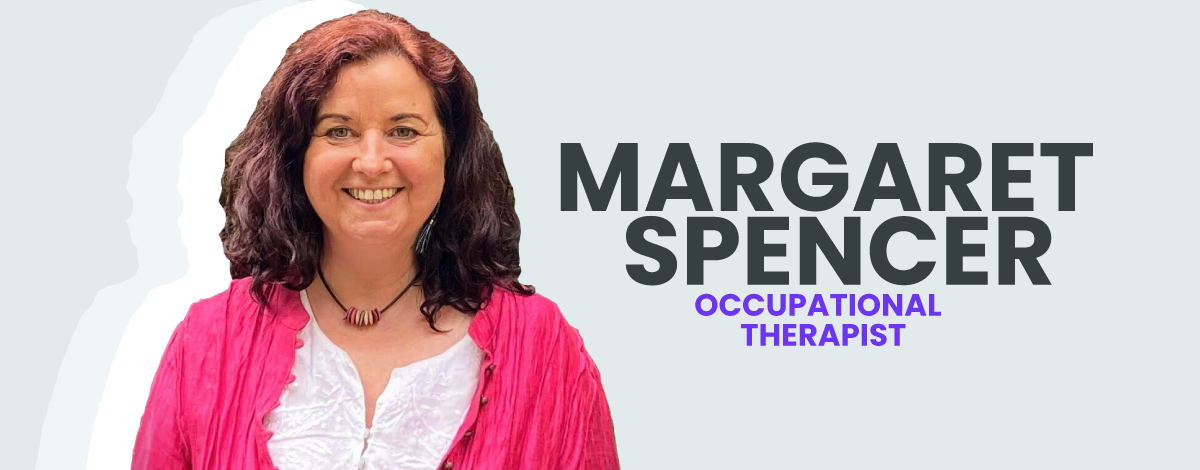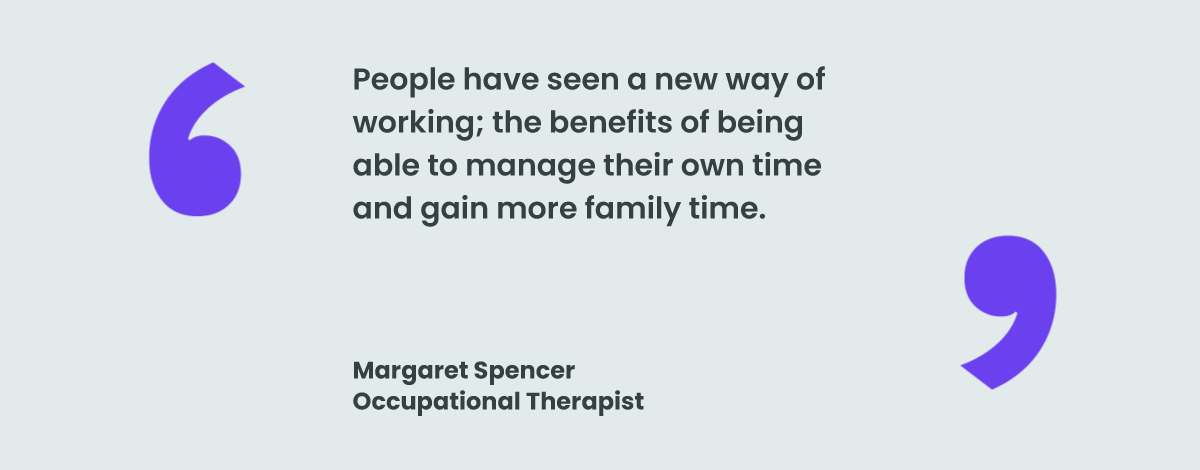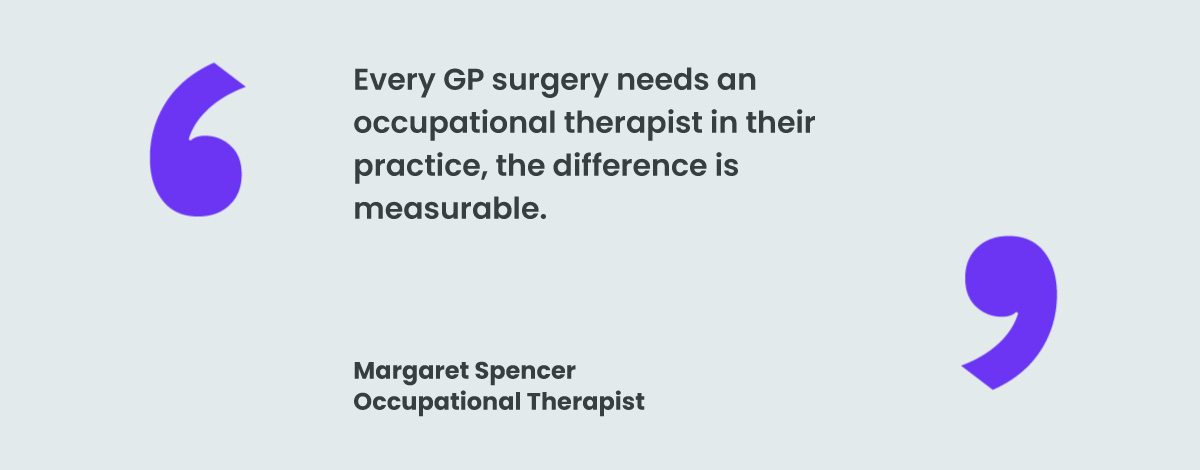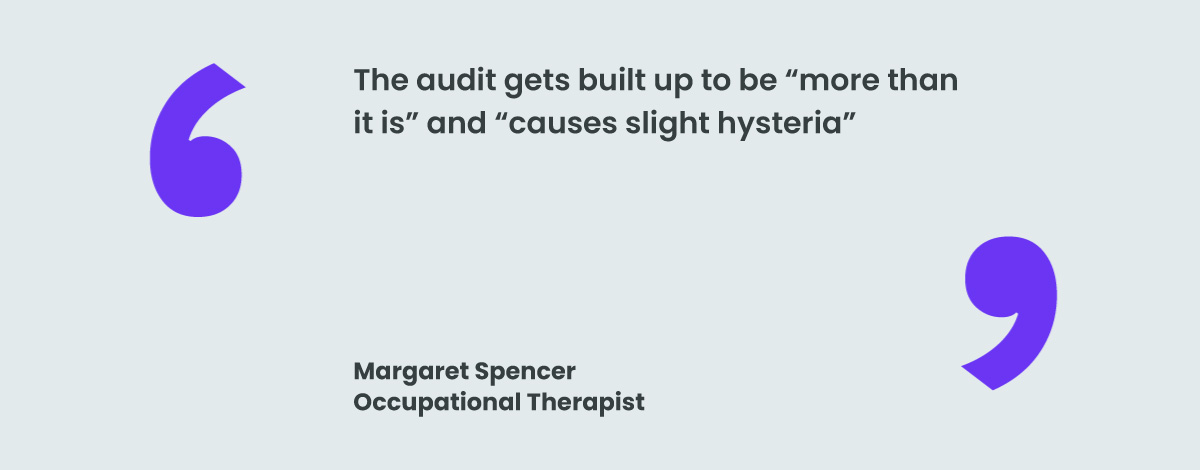Reflections with Julia: 'Everyone needs to know what occupational therapists can offer...'
27 Sep 2021Interview
Julia met Consultant Occupational Therapy Practitioner Margaret Spencer to explore her almost 40 years' experience in the profession working with people with learning disabilities, as a Senior Lecturer for 30 years and in her ongoing work providing professional supervision.

It all started in childhood
Inspired by playing with a neighbour's child who had a learning disability, Margaret knew from a young age that she wanted to work with people with learning disabilities. In Year 9 at school, she discovered Occupational Therapy during a careers lesson. Qualifying as a Band 5 in 1985, she moved from Newcastle Upon Tyne where she had studied, to Peterborough to take up a job in the Gloucester Centre; a “formative learning experience”, as after a year, the three qualified staff left and she became the Head OT managing 14 staff and delivering occupational therapy to over 50 clients.
Margaret later moved from Peterborough to Sheffied to work at Grenoside Hospital, moving people into the community. Following this she moved again to Rotherham as the Head of Learning Disabilities and deputised in the Mental Health Services.
In 1991, Margaret became part of the team setting up the first Occupational Therapy course at Sheffield Hallam University and went on to be a Senior Lecturer there for 30 years and, among her many roles there, developed the student placement programme. During this time, in partnership with another OT, she worked with Love2meetU, a dating agency for people with learning disabilities, researching, planning and delivering relationship and sexuality workshops around the Yorkshire area.
Alongside all of this, her professional supervision work has gone from strength to strength. Having just hung up her lecturing hat, she is finding herself deeply immersed in this, working with over 80 occupational therapists nationally and internationally through her business, OT360. Throughout the many years, Margaret has remained passionate about the profession and sits on the Royal College of Occupational Therapy Publications Group and is the Chair of Trent Regional Group.
A focus on supervision
Her journey delivering supervision began in 2001, having been approached by an occupational therapist looking for professional supervision to support their work at a neurological unit where Margaret had been visiting a student. From there, as they say, the rest is history! Margaret now supervises a wide range of people using Proctor’s Model, from newly qualified OTs to case managers and regional directors. Occupational therapists working with Margaret often choose to have supervision as they are lone workers or are the only occupational therapist in a multidisciplinary team; it enables them to discuss their work with someone from the same specialist perspective.
Proctor’s Model, as Margaret explains, focuses on three key aspects: Normative, which looks at current guidelines; Formative, addressing professional skills and development; and Restorative, exploring and supporting the emotional aspect of the work. It depends on each individual needs as to how much of each element is covered - it’s about offering the space to reflect, ask questions, look at the options, and reach a conclusion. Her private sessions provide a balance of support, challenge and encouragement for occupational therapists working through the highs and lows of everyday practice.
Remote work = a global reach
Due to the increase in remote working as a result of the pandemic, AHPs have been freed up to gain supervision from anywhere in the world. For those AHPs working abroad and wanting to remain HCPC-registered, Margaret advises how valuable it is to have a supervisor who is from the same profession to check in with remotely and ensure there is clear evidence of adherence to the HCPC standards.

Going independent
Having been increasingly approached by occupational therapists looking to set up their own independent practices, Margaret feels this is largely as a result of the amount of time people have had to reflect on their lifestyles of late. “People have seen a new way of working; the benefits of being able to manage their own time and gain more family time. Occupational therapists want to have more control of their work; they’re questioning what they want from their life.”
Coupled with the desire to become independent, more opportunities are arising for occupational therapists; Margaret reports a high demand for occupational therapy services as the focus changes towards preventative, person-centred, long-term care.

Changes and challenges
Over the last 10 years, Margaret has been instrumental in developing the role-emerging University student placements on the MSc Occupational Therapy course. Students are placed in pairs in a setting which does not have occupational therapy, where they scope the service and then plan and deliver an intervention for the organisation such as training or a workshop. This gives students more confidence to approach different settings and apply their knowledge, increasing their opportunities for employment. Margaret adds, “after these placements, some organisations have gone on to apply for funding for an occupational therapist, wondering why they never had one before and now couldn't manage without one!”
However, even within the broader health service, Margaret has noticed a lack of knowledge about the profession; “Everyone needs to know what occupational therapists can offer. GPs have funding, but aren’t always using it because sometimes they don’t know what occupational therapy is. Every GP surgery needs an occupational therapist in their practice, the difference is measurable".
Often it can be the more socially-economic deprived areas that understand the role occupational therapy can play in their surgeries and Margaret has observed private companies, schools and charities are increasingly employing occupational therapists; having an HCPC-registered occupational therapist "can help an organisation’s kudos and open access to different funding sources”.
Getting that CPD done
Margaret recognises there are challenges to completing CPD and offers support to those invited to the HCPC audit. She often finds most people don't record their CPD as they go along, so they have to go back through their diaries, week by week, to itemise it; this can take a couple of days if they are called for audit by the HCPC. At Julia, we regularly hear similar stories from across the AHP professions.
Margaret generally finds that occupational therapists start with good intentions - ‘this is the year I will record my CPD!’ - but, inevitably, it never happens. To help with this, Margaret records the information from her supervisory meetings in a way that is directly linked to HCPC standards, so the occupational therapists have documentation easily to hand. Margaret also advises alternative options for tracking CPD, such as an audio diary - AHPs “don’t have to write it all down”.
Margaret explains how “all the HCPC wants is for you to demonstrate that you are current in your practice”, but the audit gets built up to be “more than it is” and “causes slight hysteria”. She reports occupational therapists are often worried that they’ll be struck off, worry what they’re doing isn’t good enough, and are almost “too reflective and hypercritical”, focusing too much on their weaknesses rather than their strengths.
She often finds occupational therapists aren’t strong at identifying areas of CPD unless it relates to a formal course, but CPD doesn’t have to be so rigid; one of her favourite CPD resources is the Twitter account for the Royal College of Occupational Therapists (@theRCOT) - a “quick and easy, succinct timeline of activities”.

Next steps
Looking ahead, Margaret would like to take the next step of sitting on the board of trustees for a few places in Sheffield that work with people with learning disabilities. Overall, she has “loved the trajectory” of her career and wouldn’t change a thing. It’s been a very organic, exciting career and occupational therapy has been integral to every part of it. Margaret highlights, "it's an amazing profession and I am passionate about continuing to move it forward."
A huge thank you to Margaret for taking the time to reflect with us on her experiences. If you enjoyed this article and found it a valuable insight into the life of an OT, please share it on Twitter.
Julia helps you record, reflect, and report on your CPD through our website and app.
It's an easy way for you to stay on top of your CPD. Sign up for a 14 day free today.